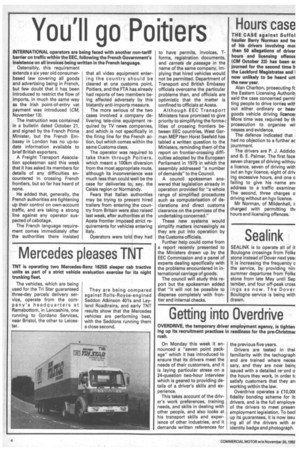You'll go Poitiers
Page 4

If you've noticed an error in this article please click here to report it so we can fix it.
INTERNATIONAL operators are being faced with another non-tariff barrier on traffic within the EEC, following the French Government's insistence on all invoices being written in the French language.
Ostensibly, this requirement extends a six year old consumerbased law covering all goods and advertising being in French, but few doubt that it has been introduced to restrict the flow of imports, in much the same way as the Irish point-of-entry vat payment was introduced (CM, November 13).
The instruction was contained in a bulletin dated October 21, and signed by the French Prime Minister, but the French Embassy in London has no up-todate information available to brief British exporters.
A Freight Transport Association spokesman said this week that it has asked its members for details of any difficulties encountered in crossing French frontiers, but so far has heard of none.
He added that, generally, the French authorities are tightening up their control on own-account traffic, and are taking a strong line against any operator suspected of cabotage.
The French language requirement comes immediately after the authorities there insisted that all video equipment entering the country should be cleared at one customs point, Poitiers, and the FTA has already had reports of two members being affected adversely by this blatantly anti-imports measure.
The more serious of the two cases involved a company delivering tele-cine equipment required by TV news companies, and which is not specifically in the firing line for the French action, but which comes within the same Customs class.
The operator was required to take them through Poitiers, which meant a 100km diversion from the most appropriate route, although its inconvenience was much less than could well be the case for deliveries to, say, the Calais region or Normandy.
Fears that Italian authorities may be trying to prevent hired trailers from entering the country from Britain were also raised last week, after authorities at the Aosta frontier imposed strict requirements for vehicle S entering Italy.
Operators were told they had to have permits, invoices, Tforms, registration documents, and carnets de passage in the name of the same company, implying that hired vehicles would not be permitted. Department of Transport and British Embassy officials overcame the particular problems then, and officials are optimistic that the matter is confined to officials at Aosta.
Although EEC Transport Ministers have promised to give priority to simplifying the formalities of crossing frontiers between EEC countries, West German MEP Herr Horst Seefeld has tabled a written question to the Ministers, reminding them of the report on frontier-crossing difficulties adopted by the European Parliament in 1979 in which the assembly addressed "a number of demands" to the Council.
A council spokesman answered that legislation already in operation provided for "a whole range of simplified procedures such as computerisation of declarations and direct customs clearance on the premises of the undertaking concerned."
These new systems would simplify matters increasingly as they are put into operation by the Customs officials.
Further help could come from a report recently presented to the Ministers drawn up by the EEC Commission and a panel of experts dealing specifically with the problems encountered in international carriage of goods.
The council will study this report but the spokesman added that "it will not be possible to dispense completely with frontier and internal checks.












































